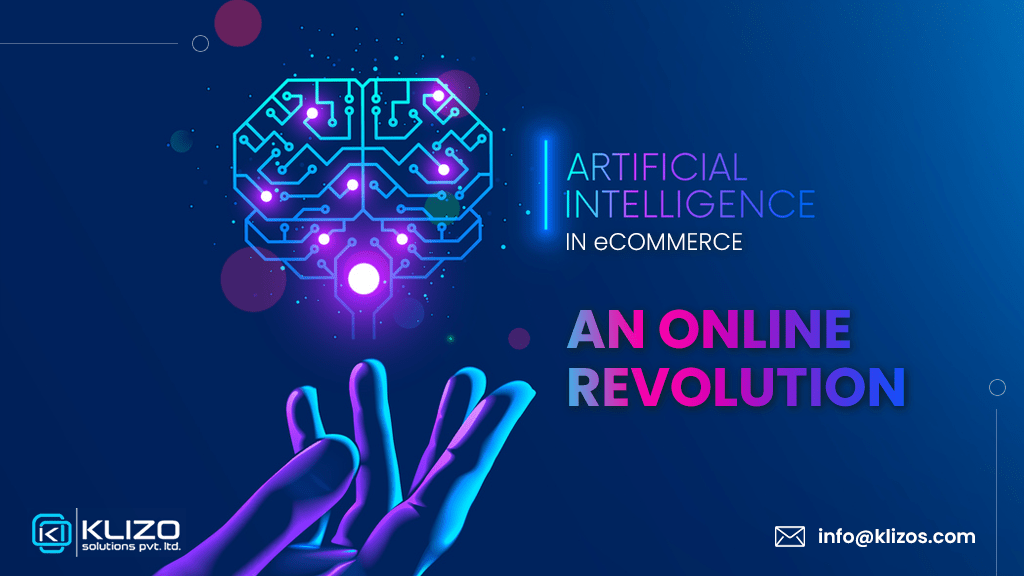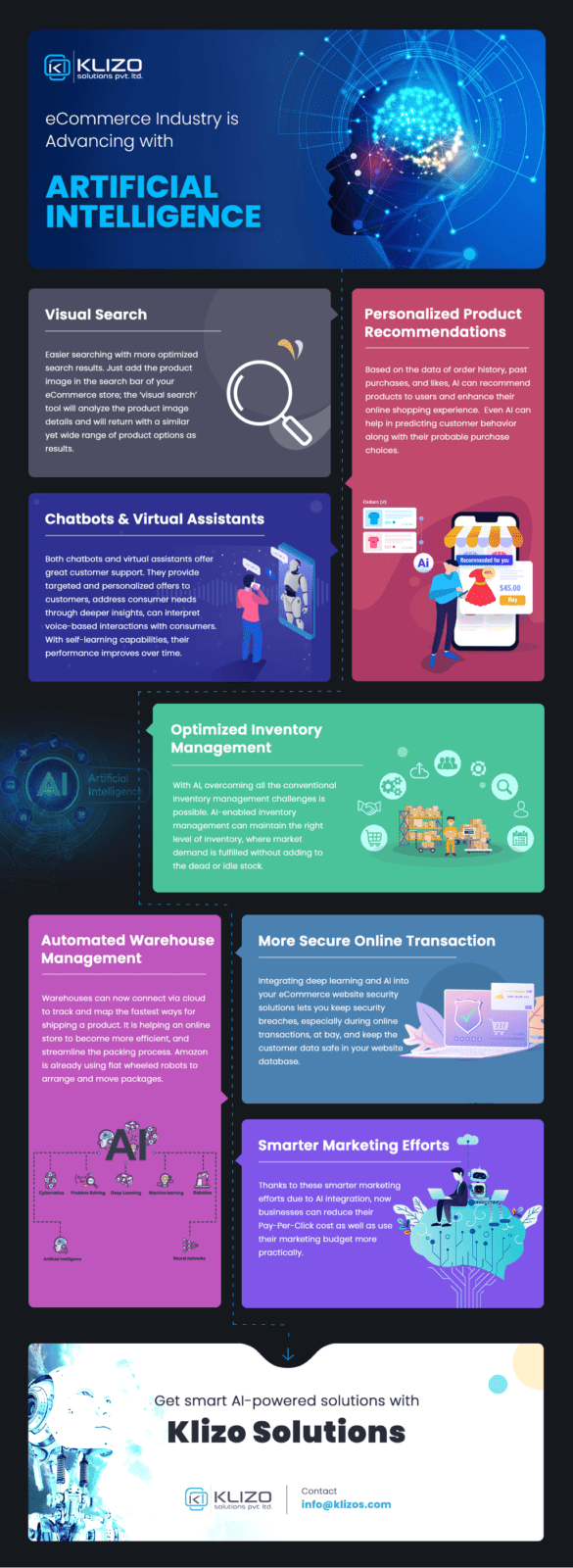


The role of artificial intelligence in eCommerce marketplaces is becoming more significant day by day.
Considering the way Artificial Intelligence is being leveraged by the eCommerce industry to simplify various online operations as well as to provide customers with a superior shopping experience; it won’t be wrong to say that AI is transforming the eCommerce landscape beyond imagination and that too super fast.
Take the success story of Amazon for example. What do you think which technology is responsible for its product cross-selling and upselling generating 35% of its total revenue? Yes, you guessed it right, the AI or artificial intelligence-enabled product recommendation technology that Amazon uses is the driving force behind such a mode of conversion.

Want to know more about how AI is revolutionizing the eCommerce industry? Then read on.

Image Source: 9to5Mac
Searching for a product on an eCommerce website has always been text-based. Entering specific product related text or keywords makes it easier to find the product.
But what happens when you aren’t aware of the keywords or don’t know how to specifically describe what you are looking for?
And that’s where comes in visual search of an AI-enabled eCommerce platform. Now, searching for a product will be easier when you get to do a visual search, one of the many benefits of artificial intelligence in eCommerce.
Yes, just add the image of the product in the search bar of the eCommerce store and the ‘visual search’ tool will analyze the details of your image such as size, color, fabric, etc. Once analyzed the details of the particular product image are analyzed, the tool will return with a similar yet wide range of product options as results.
Visual search, also known as image recognition, simply ensures easy searching, optimized search results, and enhanced customer experience.
While Amazon has added the StyleSnap feature that offers image recognition; Myntra, an Indian fashion eCommerce store also offers the customers an image search feature combined with the voice search option.

Image Source: Guides.co
The concept of personalization is nothing new in the eCommerce sector. Those who use Amazon frequently can easily understand what we are talking about. However, with the rapid advancement of machine learning and artificial intelligence technologies, deeper levels of personalization have begun to penetrate the world of eCommerce.
Artificial Intelligence in eCommerce provides product recommendations to customers through pop-ups, text messages, and emails. To understand the shopping behavior of the customers, the searches made by them are being tracked by AI. Artificial Intelligence now even displays ads and product images on search engines as well as social media platforms that are related to the interest of the users.
Based on the data of order history, past purchases, and likes, the AI technology in the eCommerce store recommends products to users and enhances their experience of online shopping. Even AI technology can help in predicting the behavior of the customers as well as their probable purchase choices.
Using AI technology, brands like Netflix, Amazon analyze past purchase data and view history to recommend different products or movies to the consumers.

Image Source: CCBill
Not familiar with the term ‘chatbots’? Well, then know that it’s a high-in-demand AI application in eCommerce that is known for its intuitiveness which enables a better shopper experience.
Both chatbots and virtual assistants are being used by the eCommerce retailers to offer 24×7 support to their online users and customers. Even the customers are becoming quite comfortable interacting with chatbots. Yes, 38% of people harbor positive opinions about chatbots, according to Business Insider.
The growth of artificial intelligence in eCommerce has enabled chatbots to ease the support load as well as drive sales through these below-mentioned capabilities:
Being built using Artificial Intelligence technology, both chatbots and virtual assistants work excellently in offering good customer support. Though both feature a human interface system, while virtual assistants like Siri, Cortana, are more user-oriented; chatbots are more company or server-oriented.
The inventory of an eCommerce website needs to stay updated always. If the real-time inventory situation or the actual situation of availability of goods is not updated, a business might end up stocking up on too many of certain products, holding dead stock, and eroding cash flow.
As conventional inventory management is restricted to only present stock levels, you are likely to come across these challenges:
But Artificial Intelligence can help overcome all these challenges of conventional inventory management. AI ensures efficient inventory management depending on the data related to:
Yes, with AI-enabled inventory management it is possible to maintain the right level of inventory where market demand is fulfilled without adding to the dead or idle stock.

Apart from making inventory management smarter than ever, Artificial intelligence also is transforming and improving the way warehouses execute operations.
Yes, it is because of the AI technology that more warehouses can now connect via cloud to track and map the fastest ways for shipping a product. And not only this, more and more companies are utilizing AI in their warehouses to improve their eCommerce platform’s performance, help it become more efficient, and streamline the packing process.
Plus, the advent of automated robots is also hinting at a superior future of artificial intelligence in eCommerce. Amazon has more than 175 fulfillment centers across the world where Amazon uses flat wheeled robots to arrange and move packages. The robots place those products closer to each other that can be grouped together to ensure easy packing,
According to Statista, the global AI software market is expected to grow to $126 billion by the end of 2026 from $10 million; thanks to the rapidly growing dependency of eCommerce stores on AI.
No matter which business you’re in, when it comes to marketing it the right way, certain expertise is required. However, when you opt for AI integration, it is Artificial Intelligence that offers different cost-effective marketing solutions to better promote your brand and products online, one of the many benefits of artificial intelligence in eCommerce.
Well, once you offer your marketing plans and campaigns to an AI platform such as Google Adwords, Bind, Facebook, etc., it is the platform that then efficiently handles all the marketing operations.
Thanks to these smarter marketing efforts due to AI integration, now businesses can reduce their Pay-Per-Click cost as well as use their marketing budget more practically.
What comes to your mind if you’re asked about the biggest threat to your eCommerce website?
Of course, it’s how you can keep the data of your consumers safe and secure. And guess what’s the good news here; AI integration increases the security of your eCommerce site’s database.
Yes, integrating deep learning and Artificial Intelligence into your eCommerce site security solutions lets you keep security breaches, especially during online transactions, at bay, and keep the customer data safe in your website database.
Want your eCommerce website to join the AI bandwagon and get ahead in the AI revolution?
Then contact us, Klizo Solutions, and get AI integrated into your eCommerce website design and development to boost customer engagement as well conversion rate.
After all, as an eCommerce business, it’s pretty obvious to wish for maximum customer engagement, retention, and conversion. To achieve this, satisfying the customer with your eCommerce site experience is necessary and that’s what exactly AI integration in your eCommerce platform does. It exceptionally improves the overall experience of the customers with your site.
So, whether you wish to know more about types of AI applicable to eCommerce websites or just want to get started with leveraging the power and capabilities of AI, connect with us and watch this cutting edge technology do wonder for your eCommerce outlet.
Previous article
Joey Ricard
Klizo Solutions was founded by Joseph Ricard, a serial entrepreneur from America who has spent over ten years working in India, developing innovative tech solutions, building good teams, and admirable processes. And today, he has a team of over 50 super-talented people with him and various high-level technologies developed in multiple frameworks to his credit.

Subscribe to our newsletter to get the latest tech updates.